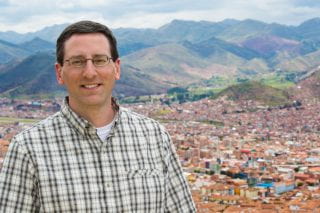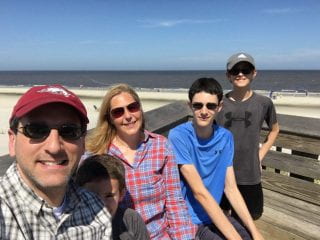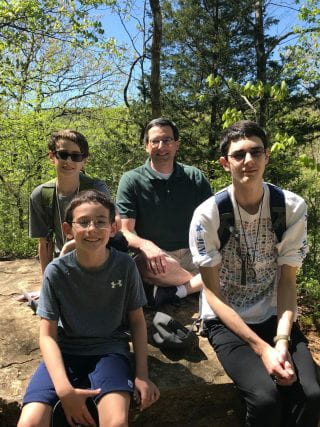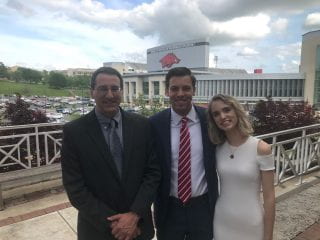A Q&A with Historian and International and Global Studies’ J. Laurence Hare
J. Laurence Hare
Associate Professor of History,
Director of the International and Global Studies Program
This summer, the University of Arkansas received a $35,000 grant as part of the U.S. Department of State’s 2019 Capacity Building Program for U.S. Study Abroad.
 At the U of A, the grant will support a new service-learning study-abroad model developed by J. Laurence Hare, director of the International and Global Studies Program in the J. William Fulbright College of Arts and Sciences, and Rogelio Garcia Contreras, director of Social Innovation in the Office of Entrepreneurship and Innovation at the Sam M. Walton College of Business.
At the U of A, the grant will support a new service-learning study-abroad model developed by J. Laurence Hare, director of the International and Global Studies Program in the J. William Fulbright College of Arts and Sciences, and Rogelio Garcia Contreras, director of Social Innovation in the Office of Entrepreneurship and Innovation at the Sam M. Walton College of Business.
Our team got to catch up with Hare this summer to learn more.
Read our Q&A below, check out the full story about the grant, or apply to study abroad with Fulbright College.
In this conversation, Hare talks about being both a modern European historian and director of the International and Global Studies Program, his passion for mentoring students and helping them reach their full potential, a new twist he’s helped develop on models for community-based global learning, and the ways studying abroad benefit a student long after their studies are completed.
Q. Tell us a little about your research, academic passions, and/or role within the College. What excites you about this?
 I am a historian of modern Europe, and my research currently focuses on the cultural and intellectual exchange between Germany and Scandinavia in the nineteenth and twentieth centuries.
I am a historian of modern Europe, and my research currently focuses on the cultural and intellectual exchange between Germany and Scandinavia in the nineteenth and twentieth centuries.
My first book, Excavating Nations (2015), traced the history of prehistoric archaeology and the ways in which representations of the distant past shaped the conflict over the German-Danish borderlands.
My current book project takes a wider view to study the German fascination with the Nordic lands and the ways in which they romanticized and appropriated Scandinavian cultures.
In these projects, I am especially interested in understanding how national communities imagined themselves across distant time horizons and through engagement with cultures beyond their borders.
Beyond my history research and teaching, I have been privileged to serve as the director of the International and Global Studies Program, which is the largest interdisciplinary program in Fulbright College.
This has been an incredibly exciting opportunity because it has allowed me to work not only with faculty colleagues across the college and the university, but also with institutional partners around the world.
And, of course, I thoroughly enjoy teaching a very accomplished group of students who care deeply about global issues.
Q. How long have you been at Fulbright College? What have you enjoyed most about your time here?
 I first came to Arkansas and joined the Fulbright College faculty in 2010, so I am getting close to my tenth anniversary.
I first came to Arkansas and joined the Fulbright College faculty in 2010, so I am getting close to my tenth anniversary.
In that time, I have discovered many things to love about working at the University of Arkansas, from excellent colleagues to enriching opportunities for cross-disciplinary collaboration.
I have especially enjoyed the many possibilities for pursuing innovative teaching and high-impact learning. This has included support for team-taught interdisciplinary courses, undergraduate research and study abroad.
Q. What do you most hope your students remember from their classes and/or interactions with you?
Why, everything, of course!
Alas, I know that students won’t necessarily retain all the details they learn in class, so I play the long game.
I am happy if students come away from my courses with a sense of the importance of asking big questions and of valuing university learning not only for its role in preparing for careers but also for its contribution to a full, enriching life.
I also try to teach students outside of the traditional classroom.
One of the most rewarding aspects of my work these days is in student mentorship. I spend a lot of time working with individual students to help them develop and reach their academic and career goals.
In these instances, I tell them not to limit themselves to asking what they want to be when they grow up, but to consider what they want to achieve and why it is important to them. Then I try to help them think about all the different ways they can go about accomplishing those underlying goals.
What I hope is that their future can thus grow from a single point in the distance to encompass a much broader horizon.
Q. What do you like to do during your time outside of the university?
 Like a lot of academics, I find that there is not a lot of daylight between life inside and outside of the university. But that’s okay by me, because I love what I do.
Like a lot of academics, I find that there is not a lot of daylight between life inside and outside of the university. But that’s okay by me, because I love what I do.
These days, I have particularly relished the opportunities for travel, having led study abroad trips and conducted research on three continents.
Of course, it is also important for me to make time for family. I have a wife and three sons, and I really love spending time with them.
Q. What’s up next on the horizon for you?
Three things. First up is a book I have coming out this fall called Essential Skills for Historians. It’s a guide to fundamental research methods that I developed while teaching in the University Perspectives program.
Second is a collaborative project that I am coordinating with colleagues across campus that involves building a research agenda for studying the impact and legacy of Fulbright internationalism and the Fulbright Exchange Program. This initiative is funded by the Chancellor’s Innovation and Collaboration Fund.
And third is a brand new study abroad model that I developed with Dr. Rogelio Garcia Contreras, a colleague in the Sam M. Walton College of Business. The program is called Global Changemakers and involves working with teams of students on key global issues in partnership with NGOs and public agencies both here in Arkansas and in international locales.
We just got a starter grant from the U.S. State Department to run a pilot program in which we learn about approaches to food security with agencies in Northwest Arkansas in the spring 2020 semester and then in the May intersession travel to Spain to make comparisons with the work of similar organizations in Barcelona.
It is a new twist on models of community-based global learning, and we can’t wait to start working with students and faculty colleagues to develop it further.
Q. Anything else you’d like to add or let readers know?
 Yes! First, my colleagues and I are always delighted to welcome students and faculty who want to work with us in International and Global Studies.
Yes! First, my colleagues and I are always delighted to welcome students and faculty who want to work with us in International and Global Studies.
We have built our program around the Fulbright College’s international vision of responsible global engagement and “peace through education.”
We now have undergraduate concentrations in European and Transatlantic Affairs and Peace, Security, and Human Rights, and we are launching a new concentration this fall on the Global South in partnership with the African and African-American Studies, the Latin American and Latino Studies, and the Middle East Studies programs.
We also have a new Global Studies minor for students across the university who want to build their global citizenship skills, and we offer our program both here in Fayetteville and at the University of Arkansas Rome Center.
Second, in the spirit of encouraging students to think about studying abroad, I want to mention that I have been serving as an academic ambassador for both the German Academic Exchange Service (DAAD) and the Alexander-von-Humboldt Program for the last few years.
If students and faculty want to know more about opportunities to study or do research in Germany, my door is always open.
Andra Parrish Liwag
Director of Communications, J. William Fulbright College of Arts and Sciences
479-575-4393 // liwag@uark.edu

